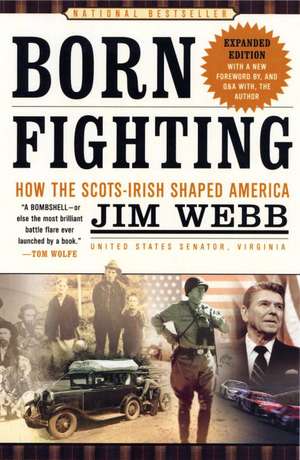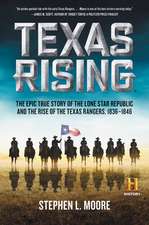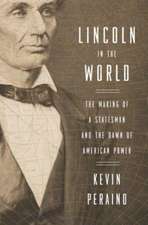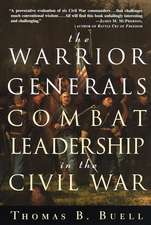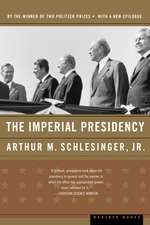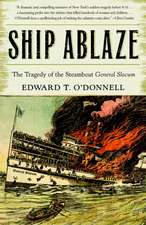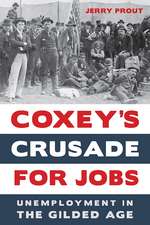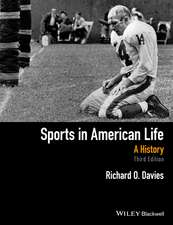Born Fighting: How the Scots-Irish Shaped America
Autor James H. Webben Limba Engleză Paperback – 30 sep 2005
Born Fighting is the first book to chronicle the full journey of this remarkable cultural group, and the profound, but unrecognized, role it has played in the shaping of America. Written with the storytelling verve that has earned his works such acclaim as “captivating . . . unforgettable” (the Wall Street Journal on Lost Soliders), Scots-Irishman James Webb, Vietnam combat veteran and former Naval Secretary, traces the history of his people, beginning nearly two thousand years ago at Hadrian’s Wall, when the nation of Scotland was formed north of the Wall through armed conflict in contrast to England’s formation to the south through commerce and trade. Webb recounts the Scots’ odyssey—their clashes with the English in Scotland and then in Ulster, their retreat from one war-ravaged land to another. Through engrossing chronicles of the challenges the Scots-Irish faced, Webb vividly portrays how they developed the qualities that helped settle the American frontier and define the American character.
Born Fighting shows that the Scots-Irish were 40 percent of the Revolutionary War army; they included the pioneers Daniel Boone, Lewis and Clark, Davy Crockett, and Sam Houston; they were the writers Edgar Allan Poe and Mark Twain; and they have given America numerous great military leaders, including Stonewall Jackson, Ulysses S. Grant, Audie Murphy, and George S. Patton, as well as most of the soldiers of the Confederacy (only 5 percent of whom owned slaves, and who fought against what they viewed as an invading army). It illustrates how the Scots-Irish redefined American politics, creating the populist movement and giving the country a dozen presidents, including Andrew Jackson, Teddy Roosevelt, Woodrow Wilson, Ronald Reagan, and Bill Clinton. And it explores how the Scots-Irish culture of isolation, hard luck, stubbornness, and mistrust of the nation’s elite formed and still dominates blue-collar America, the military services, the Bible Belt, and country music.
Both a distinguished work of cultural history and a human drama that speaks straight to the heart of contemporary America, Born Fighting reintroduces America to its most powerful, patriotic, and individualistic cultural group—one too often ignored or taken for granted.
Preț: 105.27 lei
Nou
Puncte Express: 158
Preț estimativ în valută:
20.14€ • 21.27$ • 16.76£
20.14€ • 21.27$ • 16.76£
Carte disponibilă
Livrare economică 23 decembrie 24 - 06 ianuarie 25
Preluare comenzi: 021 569.72.76
Specificații
ISBN-13: 9780767916899
ISBN-10: 0767916891
Pagini: 369
Dimensiuni: 134 x 203 x 21 mm
Greutate: 0.28 kg
Editura: BROADWAY BOOKS
ISBN-10: 0767916891
Pagini: 369
Dimensiuni: 134 x 203 x 21 mm
Greutate: 0.28 kg
Editura: BROADWAY BOOKS
Extras
1
Big Moccasin Gap
Gate city is more than four hundred miles from Arlington, down the long spine of mountains that marks Virginia's western border. It takes seven hours to drive there, interstate highway almost all the way. I go west on I-66 until it hits the mountains, then hang a left on I-81, keeping those low, blue ridges off to my right as I tear my way south, heading through history. I-81 is a busy road, lots of New York and Pennsylvania license plates weaving in and out of heavy traffic. The exit ramps whiz past my vision, heading off the interstate to towns like Staunton, Lexington, Roanoke, Radford, and Wytheville. I recognize the counties, Rockbridge, Botetourt, Franklin, and others, places where my ancestors once built log cabins and scraped corn patches out of the mud before heading farther south or west.
The mountains are beautiful, smoky from the haze that the sun makes when it burns into the pine. My mind plays tricks. I tell myself that I've been right over there, once upon a time, or at least my blood has, taking water straight from a stream and staring out into the wild unknown, dreaming of the majestic deliverance that must be just over the next horizon, hiding in a valley that no white man has ever seen before. Or maybe the next horizon, or the next one, or the next one after that. Which is why my people kept on going, some of them getting hung up, staying behind in the cul-de-sacs of Appalachian hollows while the more adventurous worked their way, rat like, through the maze until it broke out into Kentucky and then Missouri, Texas, and Colorado, and one day even hit the palm-lined beaches of California.
Because that is the story of my people, not for a generation or for ten generations but for forever. There was a time more than two thousand years ago when the Celtic tribes dominated middle Europe. They made beautiful jewelry and carvings. They were poetic and warlike. They followed strong leaders, even to their deaths. They brought their women and children to the battlefield and put them behind their ranks so they would be sure not to retreat. And they did not retreat. But they refused to recognize leadership beyond their local tribes and thus would not become a nation. And they had a permeating discontent that caused the more determined of them to keep pushing, every generation, a little bit farther into the wild unknown.
Until God played his greatest trick on them. Up the English island they moved, a generation at a time, ever northward, each generation seeing the more restless and aggressive push farther, breeding a new generation of even more restless and aggressive travelers. To the far north they moved, into what is now called Scotland, and when it ended or became too bleak they found sea bridges into Ireland. And so after hundreds or thousands of years of insistent wandering, the most migratory and curious among them found that they were caught in a cruel genetic joke, all their energies bottled up in wild, desolate places that only faced each other or the sea. So back and forth they went, across the sea bridges from Ireland to Scotland and then back again, waves of them that they now called "clans" taking out their fury on each other, then uniting once in a while when the Romans or the English sought to conquer them. The wildest, most contentious people on all the earth, trapped in a sea-bound bottleneck, their emotions spattering out into poetry and music and brawls, calling each other Irish and Scottish now, or Catholic and Protestant, anything that might make another reason for a good, hard fight.
Until they became the British Empire's greatest voyagers, indeed its greatest export, settling in odd places all around the world. And for that splinter of them that became my people, the Scots-Irish, this meant the Appalachian Mountains, their first stop on their way to creating a way of life that many would come to call, if not American, certainly the defining fabric of the South and the Midwest as well as the core character of the nation's working class.
You yourself may see cars and Burger Kings when driving along I-81. But I am watching my own ghosts: tough, resilient women on the buckboards of narrow wagons, hard men with long rifles walking alongside, and wool-clad kids tending thin herds of cattle as they make their way down the mud trail called the Wilderness Road.
That rough road, as Johnny Cash once sang. That old Breezy Creek Road. That low-down, troublesome road through Moccasin Gap.
Nearing Gate City, I dip for a few miles into the hills and ridges of Tennessee, then drop off the interstate and come down a mountain until I am back in Virginia. Soon I pass a sign that remembers Big Moccasin Gap. This was Indian hunting ground for thousands of years. Arrowheads are almost as common as acorns if you scrape the thin soil around Gate City. It was also Daniel Boone's home. His son Jim was killed by an Indian war party in Castlewood, barely twenty miles away. And from this point in 1775, Daniel Boone blazed the first trails through the mountains into Kentucky. Big Moccasin Gap. Johnny Cash wrote the song about it many years ago, probably to honor his wife, June Carter Cash, whose famed musical family was from Hiltons, six miles up the road.
I have family here, too.
From Gate City, I follow narrow, winding roads along rushing streambeds and past small frame houses built at the bottom of the ridges. The mountains loom above me. Trucks are parked along the roads. Little wooden footbridges cross the streams, leading to the front doors of the houses. American flags are frequent, on the trucks and in the yards and on the porches. America got bombed and mountain people don't forget, even if it happened in New York and Washington, because when it comes to fighting wars, mountain people have always been among the first to go.
A few miles outside of town I turn left onto a far narrower road. It has no marker other than a small hand-painted sign with an arrow and the name of a Baptist church, but I know it by heart. It wasn't so long ago that the road was still dirt. This is the entrance to Alley Hollow. My great-great-grandfather lived in this hollow. My great-grandfather left from here to move up to Kentucky. A lot of people back in Alley Hollow share my blood. And all of them share a large part of my history.
My great-great-grandparents are buried back here along with maybe a dozen others in a rough patch of woods on top of a nearby mountain. There are no headstones, only large rocks that mark individual graves. When David G. Webb died, he owned no property and the value of his possessions totaled ten dollars, neither of which was unusual in these hills. Years ago I contacted the Veterans Administration and obtained a Confederate headstone for him and my great-great-grandmother, but there is no road leading to the top of the mountain and it is a laborious trek by foot, so the heavy marker has yet to find its proper resting place. Thinking of the anonymity of their graves, I remember a time when I visited a Protestant cemetery in Northern Ireland, in a little town along the coast just north of Larne. Most of the oldest headstones were unreadable, their etchings washed away by centuries of cold rain coming in from the sea. When I asked why they had not been replaced, I was told, simply, that the families that had buried those people had moved on.
The mountain is on someone else's property, back in the hollow. My cousins have called to ask permission for us to visit it. We drive in a truck down dirt roads. Old frame houses mark our journey, their porches buckling and the springhouses along the rushing streams falling into ruin. Folks here are still moving on. They always have. That is the story of our people. The road roughens even more, ribbed like an old washboard from the rains. We pull up in front of a haunted, empty farmhouse and walk across its back pasture. Two yapping barn dogs appear from nowhere and stay with us as we head slowly up the mountain.
On top of the mountain the wind, heavy with oxygen, hits my face. I look over at the deep green waves of mountains that surround me, thinking on the one hand that it reminds me of being in the open sea, and on the other that I can now see all the way to Tennessee. And I know this is what my ancestors must have thought as well. Another mountain, and then another. Why should I stop here? And I think not only of my great-great-grandparents lying underneath my very feet, but of all the others who made me, whose lives passed through these mountains and others just like them to the north and south. Perhaps they were brave. Perhaps they were merely desperate. But they were daredevils, not only to have shown up, but also to have had the courage to leave.
On top of this mountain you can understand the Pioneer's Creed: The Cowards Never Started. The Weak Died Along the Way. Only the Strong Survived.
The names jump at me, up from the front-porch chronicles of my grandmother, out from the pages of the past. Webb, Hodges, Smith, Doyle, McKnight, Marsh, Cox, Long, Leach, Condley, Murphy, Walker, DeHaven, McBride, Miller, Jewell, Cochran, Johnson, Leckie, Chitwood, Stuart, Lane. And the others whose names just now escape me, all of them coming here from one unknown, stopping for a while, and then heading out again into another.
The earth is a ravisher in these mountains, its vines and tangles swallowing up the memories of those who went before, and in their place the wild things are moving back into the hollows. Deer are so thick that my cousin finds it hard to keep them from the alfalfa he grows for his small herd of cattle, and even from his garden. Someone nearby reported seeing elk up in the far woods. And at night if you listen close, you can hear an occasional coyote.
Standing on the mountain, I worry that when this generation dies, the memory of those who went before me will be lost just as completely, buried under the avalanche of stories that have on occasion ridiculed my people and trivialized their journey. They came with nothing, and for a complicated set of reasons, many of them still have nothing. The slurs stick to me, standing on these graves. Rednecks. Trailer-park trash. Racists. Cannon fodder. My ancestors. My people. Me.
This people gave our country great things, including its most definitive culture. Its bloodlines have flowed in the veins of at least a dozen presidents, and in many of our greatest soldiers. It created and still perpetuates the most distinctly American form of music. It is imbued with a unique and unforgiving code of personal honor, less ritualized but every bit as powerful as the samurai code. Its legacy is broad, in many ways defining the attitudes and values of the military, of working-class America, and even of the peculiarly populist form of American democracy itself. And yet its story has been lost under the weight of more recent immigrations, revisionist historians, and common ignorance.
Walking down the mountain and driving back toward the world that these people made possible for me, I make a simple vow. Or maybe I simply hear them, calling to me from the place where I will someday join them.
The contributions of this culture are too great to be forgotten as America rushes forward into yet another redefinition of itself. And in a society obsessed with multicultural jealousies, those who cannot articulate their ethnic origins are doomed to a form of social and political isolation. My culture needs to rediscover itself, and in so doing to regain its power to shape the direction of America.
2
The Radical Individualists
The scots-irish (sometimes also called the Scotch-Irish) are all around you, even though you probably don't know it. They are a force that shapes our culture, more in the abstract power of emotion than through the argumentative force of law. In their insistent individualism they are not likely to put an ethnic label on themselves when they debate societal issues. Some of them don't even know their ethnic label, and some who do know don't particularly care. They don't go for group-identity politics any more than they like to join a union. Two hundred years ago the mountains built a fierce and uncomplaining self-reliance into an already hardened people. To them, joining a group and putting themselves at the mercy of someone else's collectivist judgment makes about as much sense as letting the government take their guns. And nobody is going to get their guns.
But this is who they are, and where they came from.
Their bloodline was stained by centuries of continuous warfare along the border between England and Scotland, and then in the bitter settlements of England's Ulster Plantation in Northern Ireland. Their religion was a harsh and demanding Calvinism that sowed the seeds of America's Bible Belt, its on-your-feet independence instead of on-your-knees rituality offending English Anglicans and Irish Catholics alike. On occasion they sold themselves as indentured servants in order to escape Ulster's harshness, although unsurprisingly, they quickly became known in America as disagreeable and in-your-face when in that role.
Mostly they came in families and even large groups of families, and thus retained their cultural identity long after leaving Ireland. They came to America on small boats that took months to cross the Atlantic, as many as 30 percent of their passengers dying on a typical voyage. They settled not in the plantations along the Southern coast or in the bustling towns of New England, but in the raw and unforgiving mountain wilderness, some spilling out from settlements in New Hampshire, but the overwhelming majority populating an area along the Appalachians that stretched from Pennsylvania to Georgia and Alabama. It was not unusual to find that their first task beyond building a cabin was to defend themselves against the bloodcurdling attacks of Indian war parties.
They fought the Indians and then they fought the British, comprising 40 percent of the Revolutionary War army. They were the great pioneers--Daniel Boone, Lewis and Clark, and Davy Crockett among them--blazing the westward trails into Kentucky, Ohio, Tennessee, and beyond, where other Scots-Irishmen like Kit Carson picked up the slack. They reshaped American politics, taking hegemony away from the aristocratic English-Americans and creating the populist movement. In this role they gave us at least a dozen presidents, beginning with the incomparable Andrew Jackson and including Chester Arthur, Ulysses S. Grant, Theodore Roosevelt (through his mother), Woodrow Wilson, Ronald Reagan (again through his mother), and, most recently, Bill Clinton. It is even said that the patrician George W. Bush has a Kentucky-born, Scots-Irish ancestor.
From the Hardcover edition.
Big Moccasin Gap
Gate city is more than four hundred miles from Arlington, down the long spine of mountains that marks Virginia's western border. It takes seven hours to drive there, interstate highway almost all the way. I go west on I-66 until it hits the mountains, then hang a left on I-81, keeping those low, blue ridges off to my right as I tear my way south, heading through history. I-81 is a busy road, lots of New York and Pennsylvania license plates weaving in and out of heavy traffic. The exit ramps whiz past my vision, heading off the interstate to towns like Staunton, Lexington, Roanoke, Radford, and Wytheville. I recognize the counties, Rockbridge, Botetourt, Franklin, and others, places where my ancestors once built log cabins and scraped corn patches out of the mud before heading farther south or west.
The mountains are beautiful, smoky from the haze that the sun makes when it burns into the pine. My mind plays tricks. I tell myself that I've been right over there, once upon a time, or at least my blood has, taking water straight from a stream and staring out into the wild unknown, dreaming of the majestic deliverance that must be just over the next horizon, hiding in a valley that no white man has ever seen before. Or maybe the next horizon, or the next one, or the next one after that. Which is why my people kept on going, some of them getting hung up, staying behind in the cul-de-sacs of Appalachian hollows while the more adventurous worked their way, rat like, through the maze until it broke out into Kentucky and then Missouri, Texas, and Colorado, and one day even hit the palm-lined beaches of California.
Because that is the story of my people, not for a generation or for ten generations but for forever. There was a time more than two thousand years ago when the Celtic tribes dominated middle Europe. They made beautiful jewelry and carvings. They were poetic and warlike. They followed strong leaders, even to their deaths. They brought their women and children to the battlefield and put them behind their ranks so they would be sure not to retreat. And they did not retreat. But they refused to recognize leadership beyond their local tribes and thus would not become a nation. And they had a permeating discontent that caused the more determined of them to keep pushing, every generation, a little bit farther into the wild unknown.
Until God played his greatest trick on them. Up the English island they moved, a generation at a time, ever northward, each generation seeing the more restless and aggressive push farther, breeding a new generation of even more restless and aggressive travelers. To the far north they moved, into what is now called Scotland, and when it ended or became too bleak they found sea bridges into Ireland. And so after hundreds or thousands of years of insistent wandering, the most migratory and curious among them found that they were caught in a cruel genetic joke, all their energies bottled up in wild, desolate places that only faced each other or the sea. So back and forth they went, across the sea bridges from Ireland to Scotland and then back again, waves of them that they now called "clans" taking out their fury on each other, then uniting once in a while when the Romans or the English sought to conquer them. The wildest, most contentious people on all the earth, trapped in a sea-bound bottleneck, their emotions spattering out into poetry and music and brawls, calling each other Irish and Scottish now, or Catholic and Protestant, anything that might make another reason for a good, hard fight.
Until they became the British Empire's greatest voyagers, indeed its greatest export, settling in odd places all around the world. And for that splinter of them that became my people, the Scots-Irish, this meant the Appalachian Mountains, their first stop on their way to creating a way of life that many would come to call, if not American, certainly the defining fabric of the South and the Midwest as well as the core character of the nation's working class.
You yourself may see cars and Burger Kings when driving along I-81. But I am watching my own ghosts: tough, resilient women on the buckboards of narrow wagons, hard men with long rifles walking alongside, and wool-clad kids tending thin herds of cattle as they make their way down the mud trail called the Wilderness Road.
That rough road, as Johnny Cash once sang. That old Breezy Creek Road. That low-down, troublesome road through Moccasin Gap.
Nearing Gate City, I dip for a few miles into the hills and ridges of Tennessee, then drop off the interstate and come down a mountain until I am back in Virginia. Soon I pass a sign that remembers Big Moccasin Gap. This was Indian hunting ground for thousands of years. Arrowheads are almost as common as acorns if you scrape the thin soil around Gate City. It was also Daniel Boone's home. His son Jim was killed by an Indian war party in Castlewood, barely twenty miles away. And from this point in 1775, Daniel Boone blazed the first trails through the mountains into Kentucky. Big Moccasin Gap. Johnny Cash wrote the song about it many years ago, probably to honor his wife, June Carter Cash, whose famed musical family was from Hiltons, six miles up the road.
I have family here, too.
From Gate City, I follow narrow, winding roads along rushing streambeds and past small frame houses built at the bottom of the ridges. The mountains loom above me. Trucks are parked along the roads. Little wooden footbridges cross the streams, leading to the front doors of the houses. American flags are frequent, on the trucks and in the yards and on the porches. America got bombed and mountain people don't forget, even if it happened in New York and Washington, because when it comes to fighting wars, mountain people have always been among the first to go.
A few miles outside of town I turn left onto a far narrower road. It has no marker other than a small hand-painted sign with an arrow and the name of a Baptist church, but I know it by heart. It wasn't so long ago that the road was still dirt. This is the entrance to Alley Hollow. My great-great-grandfather lived in this hollow. My great-grandfather left from here to move up to Kentucky. A lot of people back in Alley Hollow share my blood. And all of them share a large part of my history.
My great-great-grandparents are buried back here along with maybe a dozen others in a rough patch of woods on top of a nearby mountain. There are no headstones, only large rocks that mark individual graves. When David G. Webb died, he owned no property and the value of his possessions totaled ten dollars, neither of which was unusual in these hills. Years ago I contacted the Veterans Administration and obtained a Confederate headstone for him and my great-great-grandmother, but there is no road leading to the top of the mountain and it is a laborious trek by foot, so the heavy marker has yet to find its proper resting place. Thinking of the anonymity of their graves, I remember a time when I visited a Protestant cemetery in Northern Ireland, in a little town along the coast just north of Larne. Most of the oldest headstones were unreadable, their etchings washed away by centuries of cold rain coming in from the sea. When I asked why they had not been replaced, I was told, simply, that the families that had buried those people had moved on.
The mountain is on someone else's property, back in the hollow. My cousins have called to ask permission for us to visit it. We drive in a truck down dirt roads. Old frame houses mark our journey, their porches buckling and the springhouses along the rushing streams falling into ruin. Folks here are still moving on. They always have. That is the story of our people. The road roughens even more, ribbed like an old washboard from the rains. We pull up in front of a haunted, empty farmhouse and walk across its back pasture. Two yapping barn dogs appear from nowhere and stay with us as we head slowly up the mountain.
On top of the mountain the wind, heavy with oxygen, hits my face. I look over at the deep green waves of mountains that surround me, thinking on the one hand that it reminds me of being in the open sea, and on the other that I can now see all the way to Tennessee. And I know this is what my ancestors must have thought as well. Another mountain, and then another. Why should I stop here? And I think not only of my great-great-grandparents lying underneath my very feet, but of all the others who made me, whose lives passed through these mountains and others just like them to the north and south. Perhaps they were brave. Perhaps they were merely desperate. But they were daredevils, not only to have shown up, but also to have had the courage to leave.
On top of this mountain you can understand the Pioneer's Creed: The Cowards Never Started. The Weak Died Along the Way. Only the Strong Survived.
The names jump at me, up from the front-porch chronicles of my grandmother, out from the pages of the past. Webb, Hodges, Smith, Doyle, McKnight, Marsh, Cox, Long, Leach, Condley, Murphy, Walker, DeHaven, McBride, Miller, Jewell, Cochran, Johnson, Leckie, Chitwood, Stuart, Lane. And the others whose names just now escape me, all of them coming here from one unknown, stopping for a while, and then heading out again into another.
The earth is a ravisher in these mountains, its vines and tangles swallowing up the memories of those who went before, and in their place the wild things are moving back into the hollows. Deer are so thick that my cousin finds it hard to keep them from the alfalfa he grows for his small herd of cattle, and even from his garden. Someone nearby reported seeing elk up in the far woods. And at night if you listen close, you can hear an occasional coyote.
Standing on the mountain, I worry that when this generation dies, the memory of those who went before me will be lost just as completely, buried under the avalanche of stories that have on occasion ridiculed my people and trivialized their journey. They came with nothing, and for a complicated set of reasons, many of them still have nothing. The slurs stick to me, standing on these graves. Rednecks. Trailer-park trash. Racists. Cannon fodder. My ancestors. My people. Me.
This people gave our country great things, including its most definitive culture. Its bloodlines have flowed in the veins of at least a dozen presidents, and in many of our greatest soldiers. It created and still perpetuates the most distinctly American form of music. It is imbued with a unique and unforgiving code of personal honor, less ritualized but every bit as powerful as the samurai code. Its legacy is broad, in many ways defining the attitudes and values of the military, of working-class America, and even of the peculiarly populist form of American democracy itself. And yet its story has been lost under the weight of more recent immigrations, revisionist historians, and common ignorance.
Walking down the mountain and driving back toward the world that these people made possible for me, I make a simple vow. Or maybe I simply hear them, calling to me from the place where I will someday join them.
The contributions of this culture are too great to be forgotten as America rushes forward into yet another redefinition of itself. And in a society obsessed with multicultural jealousies, those who cannot articulate their ethnic origins are doomed to a form of social and political isolation. My culture needs to rediscover itself, and in so doing to regain its power to shape the direction of America.
2
The Radical Individualists
The scots-irish (sometimes also called the Scotch-Irish) are all around you, even though you probably don't know it. They are a force that shapes our culture, more in the abstract power of emotion than through the argumentative force of law. In their insistent individualism they are not likely to put an ethnic label on themselves when they debate societal issues. Some of them don't even know their ethnic label, and some who do know don't particularly care. They don't go for group-identity politics any more than they like to join a union. Two hundred years ago the mountains built a fierce and uncomplaining self-reliance into an already hardened people. To them, joining a group and putting themselves at the mercy of someone else's collectivist judgment makes about as much sense as letting the government take their guns. And nobody is going to get their guns.
But this is who they are, and where they came from.
Their bloodline was stained by centuries of continuous warfare along the border between England and Scotland, and then in the bitter settlements of England's Ulster Plantation in Northern Ireland. Their religion was a harsh and demanding Calvinism that sowed the seeds of America's Bible Belt, its on-your-feet independence instead of on-your-knees rituality offending English Anglicans and Irish Catholics alike. On occasion they sold themselves as indentured servants in order to escape Ulster's harshness, although unsurprisingly, they quickly became known in America as disagreeable and in-your-face when in that role.
Mostly they came in families and even large groups of families, and thus retained their cultural identity long after leaving Ireland. They came to America on small boats that took months to cross the Atlantic, as many as 30 percent of their passengers dying on a typical voyage. They settled not in the plantations along the Southern coast or in the bustling towns of New England, but in the raw and unforgiving mountain wilderness, some spilling out from settlements in New Hampshire, but the overwhelming majority populating an area along the Appalachians that stretched from Pennsylvania to Georgia and Alabama. It was not unusual to find that their first task beyond building a cabin was to defend themselves against the bloodcurdling attacks of Indian war parties.
They fought the Indians and then they fought the British, comprising 40 percent of the Revolutionary War army. They were the great pioneers--Daniel Boone, Lewis and Clark, and Davy Crockett among them--blazing the westward trails into Kentucky, Ohio, Tennessee, and beyond, where other Scots-Irishmen like Kit Carson picked up the slack. They reshaped American politics, taking hegemony away from the aristocratic English-Americans and creating the populist movement. In this role they gave us at least a dozen presidents, beginning with the incomparable Andrew Jackson and including Chester Arthur, Ulysses S. Grant, Theodore Roosevelt (through his mother), Woodrow Wilson, Ronald Reagan (again through his mother), and, most recently, Bill Clinton. It is even said that the patrician George W. Bush has a Kentucky-born, Scots-Irish ancestor.
From the Hardcover edition.
Notă biografică
JAMES WEBB is the author of six novels, including Fields of Fire, Lost Soldiers, and The Emperor’s General. He is also a filmmaker (Rules of Engagement), a world-traveled, Emmy Award–winning journalist, and has taught literature at the university level. One of the most highly decorated Marines of the Vietnam War, he served as Assistant Secretary of Defense and Secretary of the Navy during the Reagan Administration. A native of St. Joseph, Missouri, he lives in Arlington, Virginia.
Recenzii
“Born Fighting is a bombshell—or else the most brilliant battle flare ever launched by a book. James Webb reveals the all-but-invisible ethnic group that has created the core beliefs of democracy American-style: our rights come from God, not the Government; all of us are born equal, and “born aristocrats” don’t exist; and tread on either of those two truths, and we’ll fight you down to the last unbroken hyoid bone. The Scots-Irish, for such is their name, have fought all our wars for us, including Vietnam. James Webb was there, and he can count. He has written not only an engrossing story but also an important work of sociological history in the tradition of the great James Graham Leyburn.”
—Tom Wolfe
—Tom Wolfe
Descriere
In his first work of nonfiction, bestselling novelist Webb tells the epic story of the Scots-Irish, a people whose lives and world view were dictated by resistance, conflict, and struggle, and who, in turn, profoundly influenced the social, political, and cultural landscape of America from its beginnings through the present day.
